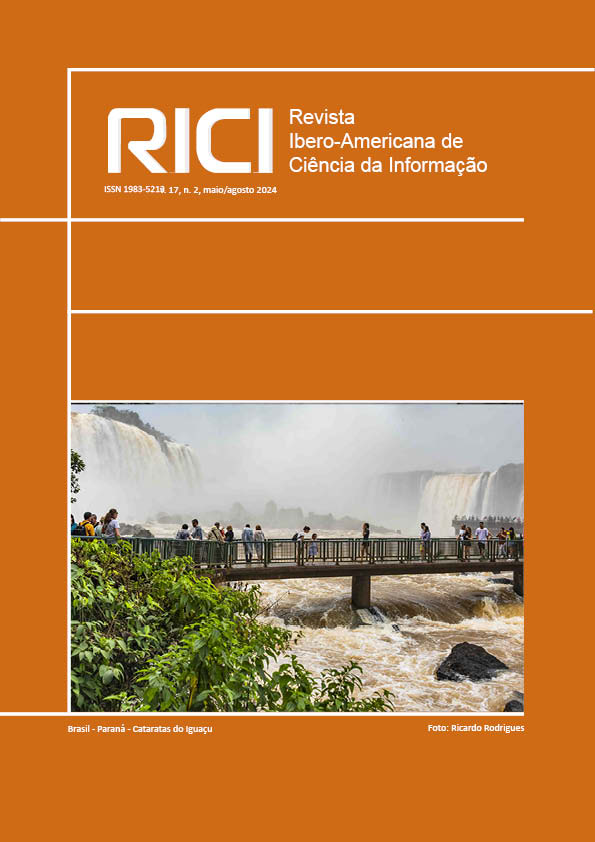Linha Viva Community Library: democratization of reading and social inclusion
DOI:
https://doi.org/10.26512/rici.v17.n2.2024.53835Keywords:
Social inclusion, Community libraries, University extension, Library and Information Science, ReadingAbstract
Reading and access to information are rights of all citizens, and guaranteeing such rights is the State’s. However, that is not always true in reality. In this context, community libraries are important tools to minimize this lack and provide greater informational democratization, contributing to social inclusion. They are spaces to exchange information, built by and for the communities they serve. They represent environments of resistance and institutional articulation, often occupying areas with few public cultural facilities, socially marginalized and scarce access to information. This paper presents the extension project developed in the Library Science School of the Federal University of Rio Grande (FURG), in Brazil, entitled "Collaborating with the Linha Viva Library". This library is fruit of a broader project called "Linha Viva", which results from a series of community actions with residents of the Fragata neighborhood in the city of Pelotas, Rio Grande do Sul, Brazil. It is a space committed to the integral formation of children and adolescents, offering the community a continuous literacy environment through activities such as tutoring. Additionally, "Linha Viva" has promoted digital inclusion actions and comprehensive health care for the families of the children and adolescents involved in the project. After discussions with the University, knowledge exchange, and sharing of ideas with representatives of this community, the extension project was conceived to contribute to the creation and development of the Community Library of the Linha Viva project. The collection consists of donations from the community and partners. The actions of the extension project initially focused on training reading agents and organizing the collection with support from professors and students of the Library Science course. The project envisaged three phases of execution: 1) training of Library Science students; 2) organization and computerization of the collection; 3) orientations to the community on the use of the library and of information and reading activities. So far, the first stage is completed, with phases 2 and 3 in progress. It is concluded that this project, in addition to providing students with the practice of university extension, has contributed to combating inequalities in access to information, considering that participatory democracy requires spaces that allow all citizens to access information, knowledge, culture, and art.
Downloads
References
Castrillón, Silvia. O direito de ler e de escrever. São Paulo: Pulo do Gato, 2011.
Cosson, Rildo. Letramento literário: teoria e prática. São Paulo: Contexto, 2006.
Freire, Paulo. Pedagogia do Oprimido. 17.ed. Rio de Janeiro: Paz e Terra: 1987.
Frigoto, Gaudêncio. Trabalho como princípio educativo: por uma superação das ambiguidades. Boletim Técnico do SENAC, Rio de Janeiro, v. 11, n. 3, p. 175-182, set./dez. 1985.
Guedes, Roger de Miranda. Bibliotecas comunitárias e espaços públicos de informação. Cultura Informacional e digital. Belo Horizonte: UFMG: s/d. Disponível em: https://www.ufmg.br/proex/cpinfo/cultura/docs/11_Bibliotecas_comunitarias_-_Roger_Guedes.pdf. Acesso em: 14 abr. 2023.
Machado, Elisa Campos. Bibliotecas comunitárias como prática social no Brasil. São Paulo: USP. Tese (doutorado) Programa de pós-graduação em Ciência da Informação. Universidade de São Paulo, BR-SP, 2008.
Machado, Elisa Campos. C. Uma discussão acerca do conceito de biblioteca comunitária. Revista Digital de Biblioteconomia e Ciência da Informação, Campinas, v. 7, n. 1, p. 80-94, jul./dez. 2009.
O QUE é uma biblioteca comunitária? 2014. Disponível em: <http://releiturape.wordpress.com/o-que-e-uma-biblioteca-comunitaria>. Acesso em: 06 abr. 2023.
Prado, G. M. Bibliotecas comunitárias como território de memória interagindo práticas da aprendizagem e mudanças. DataGramaZero: Revista de Ciência da Informação, Rio de Janeiro, v. 10, n. 6, dez. 2009.
Santos, Milton. Técnica, Espaço, Tempo: globalização e meio técnico-científico informacional. São Paulo: Hucitec, 1997.
UNICEF. Dois milhões de crianças e adolescentes de 11 a 19 anos não estão frequentando a escola no Brasil, alerta UNICEF. 2022. Disponível em: https://www.unicef.org/brazil/comunicados-de-imprensa/dois-milhoes-de-criancas-e-adolescentes-de-11-a-19-anos-nao-estao-frequentando-a-escola-no-brasil. Acesso em: 17 jun. 2023.
Universidade Federal do Rio Grande. Conselho de Ensino, Pesquisa, Extensão e Administração. Resolução COEPEA/FURG nº 29, de 25 de março de 2022. Dispõe sobre a Curricularização da Extensão nos Cursos de Graduação da Universidade Federal do Rio Grande - FURG. 2022.
VygotskY, Lev Semenovich. A formação social da mente: o desenvolvimento dos processos psicológicos superiores. 6. ed. São Paulo: Martins Fontes, 1998.
Downloads
Published
How to Cite
Issue
Section
License
Copyright (c) 2024 Renata Braz Gonçalves, Thais Gonçalves Saggiomo, Maria de Fátima Santos Maia, Ediene Crisnei da Silva Ruiz, Carlos Roberto Bönemann Buchweitz, Vitória Fernandes Peres

This work is licensed under a Creative Commons Attribution 4.0 International License.
Copyright Notice
Authors who publish in this journal agree to the following terms:
- Authors retain copyright and grant the journal right of first publication with the work simultaneously licensed under the Creative Commons Attribution License 4.0, allowing the sharing of work and recognition of the work of authorship and initial publication in this journal.
- Authors are able to take on additional contracts separately, non-exclusive distribution of the version of the paper published in this journal (ex.: distribute to an institutional repository or publish as a book), with an acknowledgment of its initial publication in this journal.
- Authors are permitted and encouraged to distribute their work online (eg.: in institutional repositories or on their website) at any point before or during the editorial process, as it can lead to productive exchanges, as well as increase the impact and citation the published work.
















